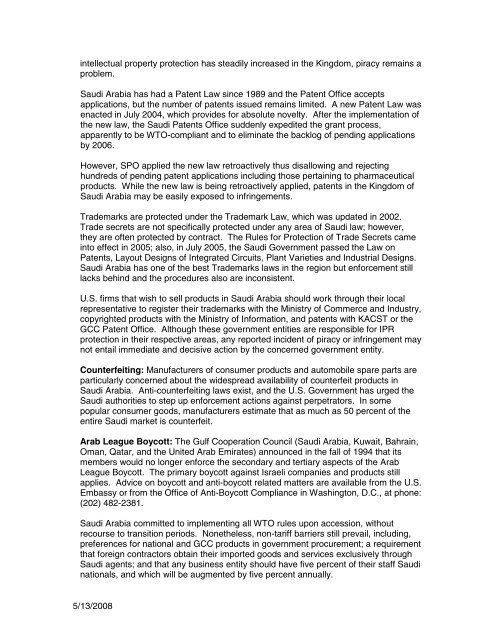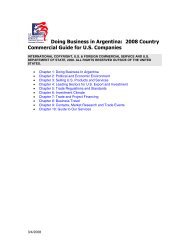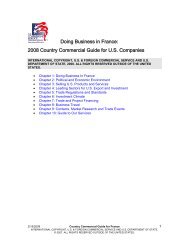Doing Business In Saudi Arabia - Bna
Doing Business In Saudi Arabia - Bna
Doing Business In Saudi Arabia - Bna
Create successful ePaper yourself
Turn your PDF publications into a flip-book with our unique Google optimized e-Paper software.
intellectual property protection has steadily increased in the Kingdom, piracy remains a<br />
problem.<br />
<strong>Saudi</strong> <strong>Arabia</strong> has had a Patent Law since 1989 and the Patent Office accepts<br />
applications, but the number of patents issued remains limited. A new Patent Law was<br />
enacted in July 2004, which provides for absolute novelty. After the implementation of<br />
the new law, the <strong>Saudi</strong> Patents Office suddenly expedited the grant process,<br />
apparently to be WTO-compliant and to eliminate the backlog of pending applications<br />
by 2006.<br />
However, SPO applied the new law retroactively thus disallowing and rejecting<br />
hundreds of pending patent applications including those pertaining to pharmaceutical<br />
products. While the new law is being retroactively applied, patents in the Kingdom of<br />
<strong>Saudi</strong> <strong>Arabia</strong> may be easily exposed to infringements.<br />
Trademarks are protected under the Trademark Law, which was updated in 2002.<br />
Trade secrets are not specifically protected under any area of <strong>Saudi</strong> law; however,<br />
they are often protected by contract. The Rules for Protection of Trade Secrets came<br />
into effect in 2005; also, in July 2005, the <strong>Saudi</strong> Government passed the Law on<br />
Patents, Layout Designs of <strong>In</strong>tegrated Circuits, Plant Varieties and <strong>In</strong>dustrial Designs.<br />
<strong>Saudi</strong> <strong>Arabia</strong> has one of the best Trademarks laws in the region but enforcement still<br />
lacks behind and the procedures also are inconsistent.<br />
U.S. firms that wish to sell products in <strong>Saudi</strong> <strong>Arabia</strong> should work through their local<br />
representative to register their trademarks with the Ministry of Commerce and <strong>In</strong>dustry,<br />
copyrighted products with the Ministry of <strong>In</strong>formation, and patents with KACST or the<br />
GCC Patent Office. Although these government entities are responsible for IPR<br />
protection in their respective areas, any reported incident of piracy or infringement may<br />
not entail immediate and decisive action by the concerned government entity.<br />
Counterfeiting: Manufacturers of consumer products and automobile spare parts are<br />
particularly concerned about the widespread availability of counterfeit products in<br />
<strong>Saudi</strong> <strong>Arabia</strong>. Anti-counterfeiting laws exist, and the U.S. Government has urged the<br />
<strong>Saudi</strong> authorities to step up enforcement actions against perpetrators. <strong>In</strong> some<br />
popular consumer goods, manufacturers estimate that as much as 50 percent of the<br />
entire <strong>Saudi</strong> market is counterfeit.<br />
Arab League Boycott: The Gulf Cooperation Council (<strong>Saudi</strong> <strong>Arabia</strong>, Kuwait, Bahrain,<br />
Oman, Qatar, and the United Arab Emirates) announced in the fall of 1994 that its<br />
members would no longer enforce the secondary and tertiary aspects of the Arab<br />
League Boycott. The primary boycott against Israeli companies and products still<br />
applies. Advice on boycott and anti-boycott related matters are available from the U.S.<br />
Embassy or from the Office of Anti-Boycott Compliance in Washington, D.C., at phone:<br />
(202) 482-2381.<br />
<strong>Saudi</strong> <strong>Arabia</strong> committed to implementing all WTO rules upon accession, without<br />
recourse to transition periods. Nonetheless, non-tariff barriers still prevail, including,<br />
preferences for national and GCC products in government procurement; a requirement<br />
that foreign contractors obtain their imported goods and services exclusively through<br />
<strong>Saudi</strong> agents; and that any business entity should have five percent of their staff <strong>Saudi</strong><br />
nationals, and which will be augmented by five percent annually.<br />
5/13/2008












